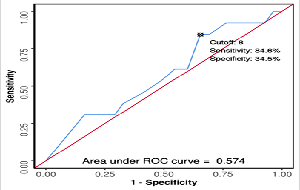Is Sequential Organ Failure Assessment Score (SOFA) Valid for Predicting Maternal Outcomes in Pregnancy Associated Sepsis, or Limited to General Population Use?
Authors
##plugins.themes.bootstrap3.article.main##
Abstract
Objective: To assess the prognostic value of the Sequential Organ Failure Assessment score in predicting maternal and neonatal outcomes among women with pregnancy-associated sepsis. Design: A prospective observational study. Subjects/Patients: One hundred antenatal, postnatal, and postabortal women admitted with sepsis were enrolled after informed consent. Methods: The Sequential Organ Failure Assessment score was calculated at admission. The relationship of the score with maternal survival, neonatal admission to intensive care, duration of intensive care stay, and extent of organ dysfunction was evaluated using non-parametric statistical analysis and receiver operating characteristic curve assessment. Results: The mean Sequential Organ Failure Assessment score was significantly higher in women who expired (10.08 ± 3.72) compared to survivors (3.50 ± 3.43, p<0.001). The score showed good diagnostic performance for predicting maternal mortality, with an area under the curve of 0.894. A cutoff value of six predicted death with 89 percent sensitivity and 76 percent specificity. Multi-organ dysfunction involving three or more organs was present in 23 percent of patients and was strongly associated with poor outcome. Higher scores correlated with longer intensive care stay and shorter overall hospital stay. The score demonstrated poor discriminative value for predicting neonatal intensive care admission. Conclusion: The Sequential Organ Failure Assessment score is a valuable tool for maternal risk stratification in pregnancy-associated sepsis, though it lacks predictive accuracy for neonatal outcomes.
##plugins.themes.bootstrap3.article.details##
Copyright (c) 2025 Dr. Pratima Verma, Dr Renu Gupta, Dr Garima Sharma, Dr Bandana Sharma, Dr Farheen Shiddhiqi, Dr Shakuntla Kumari

This work is licensed under a Creative Commons Attribution 4.0 International License.
Creative Commons License All articles published in Annals of Medicine and Medical Sciences are licensed under a Creative Commons Attribution 4.0 International License.
Dr. Pratima Verma, Associate Professor, Department of Obstetrics and Gynecology, GSVM Medical College, Kanpur, Uttar Pradesh 208002, India.
Associate Professor, Department of Obstetrics and Gynecology, GSVM Medical College, Kanpur, Uttar Pradesh 208002, India.
Dr Renu Gupta, Professor & Head, Department of Obstetrics and Gynecology, GSVM Medical College, Kanpur, Uttar Pradesh 208002, India.
Professor & Head, Department of Obstetrics and Gynecology, GSVM Medical College, Kanpur, Uttar Pradesh 208002, India.
Dr Garima Sharma, Assistant Professor, Department of Pathology, GSVM Medical College, Kanpur, Uttar Pradesh 208002, India.
Assistant Professor, Department of Pathology, GSVM Medical College, Kanpur, Uttar Pradesh 208002, India.
Dr Bandana Sharma, Professor, Department of Obstetrics and Gynecology, GSVM Medical College, Kanpur, Uttar Pradesh 208002, India.
Professor, Department of Obstetrics and Gynecology, GSVM Medical College, Kanpur, Uttar Pradesh 208002, India.
Dr Farheen Shiddhiqi, Assistant Professor, Department of Obstetrics and Gynecology, GSVM Medical College, Kanpur, Uttar Pradesh
Assistant Professor, Department of Obstetrics and Gynecology, GSVM Medical College, Kanpur, Uttar Pradesh
Dr Shakuntla Kumari, Department of Obstetrics and Gynecology, GSVM Medical College, Kanpur, Uttar Pradesh 208002, India.
Department of Obstetrics and Gynecology, GSVM Medical College, Kanpur, Uttar Pradesh 208002, India.
[1] Ali A, Lamont RF. Recent advances in the diagnosis and management of sepsis in pregnancy. F1000Res. 2019;8. [DOI] [PMC free article] [PubMed]
[2] Woodd SL, Montoya A, Barreix M, Pi L, Calvert C, Rehman AM, Chou D, Campbell OMR. Incidence of maternal peripartum infection: a systematic review and meta-analysis. PLoS Med. 2019;16:e1002984. doi: 10.1371/journal.pmed.1002984. [DOI] [PMC free article] [PubMed] [Google Scholar]
[3] Singer M, Deutschman CS, Seymour CW, et al. The third international consensus definitions for sepsis and septic shock (sepsis-3) JAMA. 2016;315:801–810. doi: 10.1001/jama.2016.0287. [DOI] [PMC free article] [PubMed] [Google Scholar]
[4] Rhodes A, Evans LE, Alhazzani W, Levy MM, Antonelli M, Ferrer R, et al. Surviving sepsis campaign: international guidelines for management of sepsis and septic shock: 2016. Intensive Care Med. 2017;43:304–377. doi: 10.1007/s00134-017-4683-6. [DOI] [PubMed] [Google Scholar]
[5] Bonet M, Nogueira Pileggi V, Rijken MJ, Coomarasamy A, Lissauer D, Souza JP, et al. Towards a consensus definition of maternal sepsis: results of a systematic review and expert consultation. Reprod Health. 2017;14:67. doi: 10.1186/s12978-017-0321-6. [DOI] [PMC free article] [PubMed] [Google Scholar]
[6] Ministry of Home Affairs, Government of India. Sample registration system (SRS) – Special bulletin on Maternal Mortality in India 2017–19. 2022. Available at: https://censusindia.gov.in/nada/index.php/catalog/40525. Accessed on: 23 May 2019.
[7] Soubra SH, Guntupalli KK. Critical illness in pregnancy: An overview. Crit Care Med 2005;33(10 Suppl.): S248–S255. DOI: 10.1097/01.ccm.0000183159.31378.6a.
[8] Nupur Anand1, AV Gokhale2. Sequential Organ Failure Assessment Scoring Tool for Prediction of Outcome in Obstetric Intensive Care Unit at Tertiary Care Center.2019- 2023https://doi.org/10.5005/jp-journals-10006-2290
[9] Agarwal R, Goyal P, Mohta M, Kar R. Comparison of Sequential Organ Failure Assessment (SOFA) and Sepsis in Obstetrics Score (SOS) in Women with Pregnancy- Associated Sepsis with Respect to Critical Care Admission and Mortality: A Prospective Observational Study. J Obstet Gynaecol India. 2021 Feb;71(1):45-51. doi: 10.1007/s13224-020-01375-9. Epub 2020 Sep 25. PMID: 33814798; PMCID: PMC7960863.

